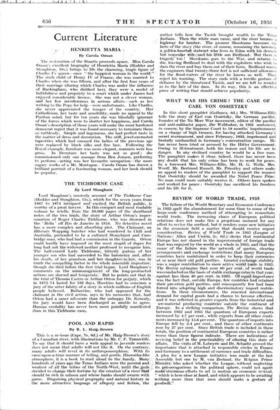REVIEW OF WORLD TRADE, 1935 The failure of the World
Monetary and Economic Conference in .1933..spelt the abandonment for some time to come of the ' large-scale conference method of attempting to resuscitate world _trade. The increasing chaos of European political
relations does not make this a propitious moment for any effort to revive the method, but it renders some new initiative in the economic field a matter that should receive urgent
consideration.- Review of ,World Trade in 1-985 (League of
Nations : Allen and UnWin, 2s2 6d.) 'slio`vts that 'continental ! Europe • has not shared in the imProVement of foreign trade
: that was-enjoYed.bythe-warld as a whole in1035,•and that the . mink' Of- the failure Was the network of quotas, clearing !arrangeinents.-and,exchange restrictions that niafiy: European Countries! have maintained in order to keep _their cutTencies at or near their old gold parities.. greater exchafige stability was a major contribution to More active world trckle in 1935. The Review estimates that. over80•per cent. .ot world trade was'COndueteclOn the basis of stable exchange ratessin that year agdast less than; 44:1. per emit. in. 1966. Of etWaf•hrort.ture was the fact that, outside Europe, few countria had retained their pre-crisis gold parities, and consequently few had been forced into adopting high and discriminatory import restric- tions. In these circumstances, the renewed international demand for capital goods hada chance to become effective, and it was reflected in greater exports from the industrial and aw-material producing • countries'. outside' the continent of Europe. In a striking comparison, The Review shows that between 1932 and 1935 the quantum of European exports increased by 4.7 per cent., while exports from all other conti- nents increased by 15.6 percent. The quantum of imports into Europe fell by 2.4 per cent., and those of other continents rose by 27 per cent. Since British trade is included in :these totals, the position of continental European countries is rather worse than these figures indicate. There are indications of reviving belief in the practicability of altering this state of affairs. The visits of M. Labeyrie And Dr. Schacht proved the importance that is attached in responsible circles in France and Germany to a settlement of currency and trade difficulties. A plea for a new League initiative was- made at the last Asseinbry but one by M. van Zeeland, the Belgian Prime Ministr; :ivho asked whether the League, without neglecting its pAtioeCapations in the political sphere, could not again malestrentious efforts to set in motion an economic rmtival, "which is here close at hand, and which appears to be awaiting nothing more than that men should make a gesture of goodwill."




















































 Previous page
Previous page